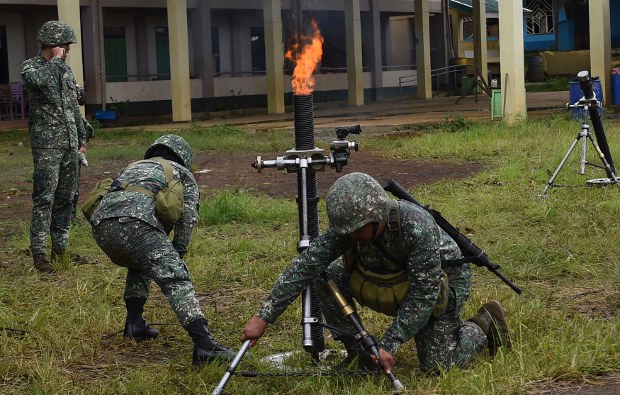Philippine Congress Extends Martial Law in Mindanao
2017.07.22
Iligan, Philippines
 Philippine Marines prepare to fire mortars at Muslim militant positions at the frontline in Marawi, on the southern island of Mindanao, July 22, 2017.
Philippine Marines prepare to fire mortars at Muslim militant positions at the frontline in Marawi, on the southern island of Mindanao, July 22, 2017.
The Philippine Congress on Saturday voted to extend President Rodrigo Duterte’s martial law for five months in the southern island of Mindanao, giving security officials more time to end what they said was a rebellion by local militants backed by the Islamic State (IS).
Duterte previously said the extension was necessary to crush IS-backed militants who have been occupying parts of the southern city of Marawi since May.
Two hundred and forty-five members of the 294-seat House of Representatives and 16 of the 24-member Senate approved Dutere’s request, which extends military rule in the entire southern part of the country until the end of December.
The overwhelming favorable vote has been expected, with Duterte controlling a majority in both chambers.
“The extension of martial law is essential to the overall peace and stability,” Duterte’s spokesman, Ernesto Abella, said in a statement shortly after the vote. “The rebellion in Marawi continues to persist and we want to stop the spread of evil ideology of terrorism and free the people of Mindanao from the tyranny of lawlessness and violent extremism.”
Martial law gives the military extraordinary police powers, allowing soldiers to detain people without charge for long periods.
Military spokesman Col. Edgar Arevalo urged the public to rally behind government forces fighting in Marawi.
“The task to neutralize the terrorist-extremists and degrade their capability, to rescue civilians trapped or held hostage, and to set the conditions for reconstruction and rehabilitation of the city is daunting,” he said.
The fighting began on May 23, after the military and police launched an operation to capture Abu Sayyaf leader Isnilon Hapilon – the acknowledged leader of the IS here – who was spotted in Marawi. But they were pushed back by a huge enemy force, including fighters from the local Maute group backed by Southeast Asian and Middle Eastern fighters.
The gunmen took over the city, burned buildings, held dozens of hostages and allegedly beheaded residents who were identified as Christians, forcing its estimated 200,000 residents to flee.
The military responded by deploying combat-tested soldiers and by dropping bombs on areas identified as under rebel control.
But after two months, the gunmen have managed to survive the bombing runs, and the military said they appeared to be well-entrenched and stocked full of ammunition. They extremists also are believed to be holding about 300 hostages, Duterte said on Friday, adding that he has ordered soldiers to be extra cautious in their advance.
The death toll in two months of fighting stood at 99 soldiers, 421 militants and 45 civilians as of Friday, officials said.
Edcel Lagman, a congressman who voted against the extension, argued that there was “no sufficient factual basis” for the request. He said what was happening in Marawi was “lawless violence amounting to terrorism, not actual rebellion.”
“The president and his subalterns failed to sufficiently show the element of culpable political purpose of the terrorist groups,” Lagman said. He warned that the escalating number of deaths and massive destruction would be aggravated by the martial law extension.
In his letter requesting for an extension, Duterte said it appeared that militant leaders have survived the military assault on Marawi, a former scenic trading hub.
Of the 600 militants known to be fighting in Marawi, about 220 or so were still entrenched in four neighborhoods in Marawi’s central business district, Duterte said.
His statement contradicted the military’s earlier estimate that just 60 fighters remained holed out in the area.
Hapilon, as well as brothers Omarkhayam and Abdullah Maute, also remain at large despite previous military reports to the contrary, Duterte said, adding that a Malaysian militant, Mahmud bin Ahmad, who allegedly was the conduit for IS funds coming from the Middle East, was also believed to be still in Marawi.
Felipe Villamor in Manila contributed to this report.







